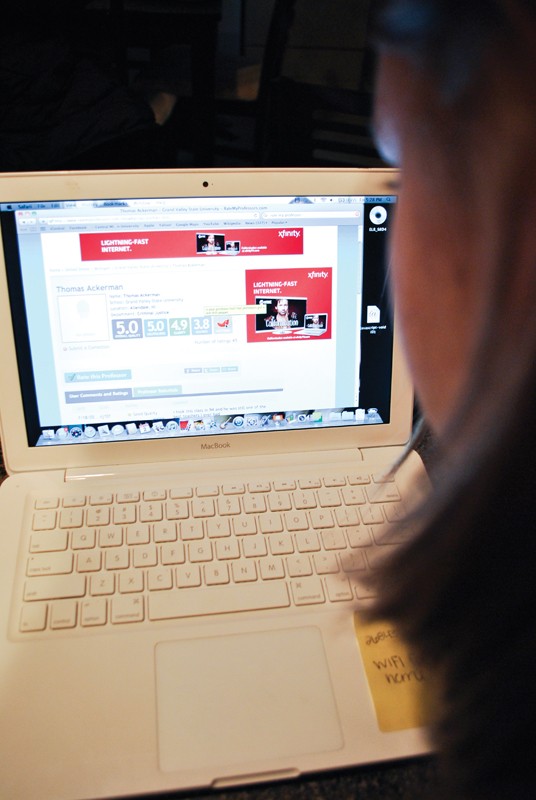The good professor or the easy professor?

GVL / Allison Young A GVSU student searches through the ratemyprofessors.com website
Mar 12, 2012
With the 2012-13 course registration opening next week, many students are hitting RateMyProfessors.com to decide which course sections they should aim for.
The website allows college students to rate their professors on overall quality, clarity, easiness and “hottness” [sic]. Students can also comment about the professors and give positive or negative feedback on their educational experience.
According to RateMyProfessors.com’s Facebook page, the site evaluates more than 1.5 million professors from over 7,500 colleges and universities in the U.S., Canada and the United Kingdom. GVSU has 2,453 professor reviews on the site and 200 comments about the school in general.
A 2008 study titled “Does RateMyProfessors.com really rate my professor?” for the “Assessment & Evaluation in Higher Education” journal said the site shows students’ bias based on a professor’s personality, charisma and grading leniency, and that the information does not reveal a professor’s teaching effectiveness.
GVSU freshman Anna Biggio said she uses the site to help choose her classes.
“I want to find an easy and helpful professor for the class,” Biggio said, adding she finds the website helpful and effective because all of her professors have been great so far.
Although many students depend on the site, Bart Merkle, dean of students at GVSU, said students should be careful and cautious when using RateMyProfessors.com.
“You don’t know who is putting stuff up,” said Merkle, who has explored the site, himself, but said there is no real way of knowing if the information is credible. He added that there is not a way for students to crosscheck and validate comments that are being written on the website. “I think you are better off talking with people you know and trust.”
Biggio said she does not believe everything on the site and takes into account that “people who are interested in a class may find it easier than students who are indifferent,” and therefore give the professor better ratings.
The study argued that ratings on these websites could potentially be positive for both students and professors. For example, students can choose professors who fit their particular learning styles, and professors with negative comments can learn from the ratings and improve their performances.
While many students use the website to evaluate professors, Mary Schutten, associate dean for students for CLAS, said she does not know of any deans that use the site to determine whether to hire or keep certain professors.
“Deans would not use this site as it is not part of the evaluation process of professors (at GVSU).” Schutten said.
Merkle said the university uses its own course evaluations at the end of each semester to get student feedback about classes and professors.
The study also showed that professors with characteristics such as easiness and attractiveness, as perceived by students, had more positive ratings and comments.
RateMyProfessor.com has been around for 13 years and was the inspiration for other evaluation websites like Myedu.com, ProfessorPerformance.com and RateMyTeacher.com.
For more professional advice about course selection, visit an advisor or the GVSU advising department. For more information on course registration dates, check that website at www.gvsu.edu/schedule/registration-schedule-for-2012-2013-72.htm.





















